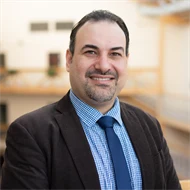Mustafa Nourallah
Mustafa Nourallah is a lecturer in business administration and affiliated with CER - Center for Research on Economic Relationships. His main focus is on Digital Banking and Finance, specifically how individuals and companies manage financial transactions.
Tell us about Mustafa Nourallah.
I am an Assistant Professor (tenure track) at Mid Sweden University and project leader for CER’s research area Digital Banking and Finance. My focus is on exploring how financial technology can be leveraged to improve households’ personal financial well-being.
My research is characterized by an interdisciplinary approach that draws on theories from finance, information technology, and cognitive science. My work has been published in international scientific journals such as the Journal of Business Research. I have served as a reviewer for various journals, as Associate Editor for Financial Services Review (ISSN: 1057-0810), Vice President (International) for the Academy of Financial Services (USA), member of the advisory board for CER, and keynote speaker on FinTech at two international conferences.
I have also chaired tracks at several international conferences and received recognition along with research grants, including the Hans Dalborg Award for Excellence in Research in Financial Economics (2025), Nordea’s Norrland Foundation Scientific Award (2024), and the Best Paper Award in Behavioral Finance at the 34th Annual Meeting of the Academy of Financial Services (USA).
Why did you become a researcher?
It is fascinating to see how society has evolved from using gold and coins to adopting digital payment methods such as online banking. Today, the conversation has expanded to include decentralized finance, blockchain technology, and tokenization. As a researcher, I strive to make a meaningful difference by deepening our understanding of how individuals and firms interact with these emerging solutions—and how they can improve their quality of life by using them effectively.
What is your research about?
I am interested in how financial technology (FinTech) can be applied to improve household financial well-being and support the achievement of the UN Sustainable Development Goals. I have developed an interdisciplinary research background by combining theories from finance, information technology, and cognitive science. This has enabled me to make a modest contribution to identifying the critical factors that shape individuals’ adoption of technology.
In my future FinTech research, I intend to draw on behavioral finance as well as the capability approach developed by Amartya Sen, Nobel Laureate in Economics (1998), while also integrating insights from financial literacy.
Dream scenario in terms of your work?
I consider my role at CER a dream job. It allows me to share knowledge with students, conduct research with the potential for meaningful social impact—both nationally and internationally—and engage in volunteer initiatives. I also aspire to apply my research to enhance the financial well-being of people in marginalized communities or those affected by the negative consequences of unstable situations such as natural disasters.
Contact

